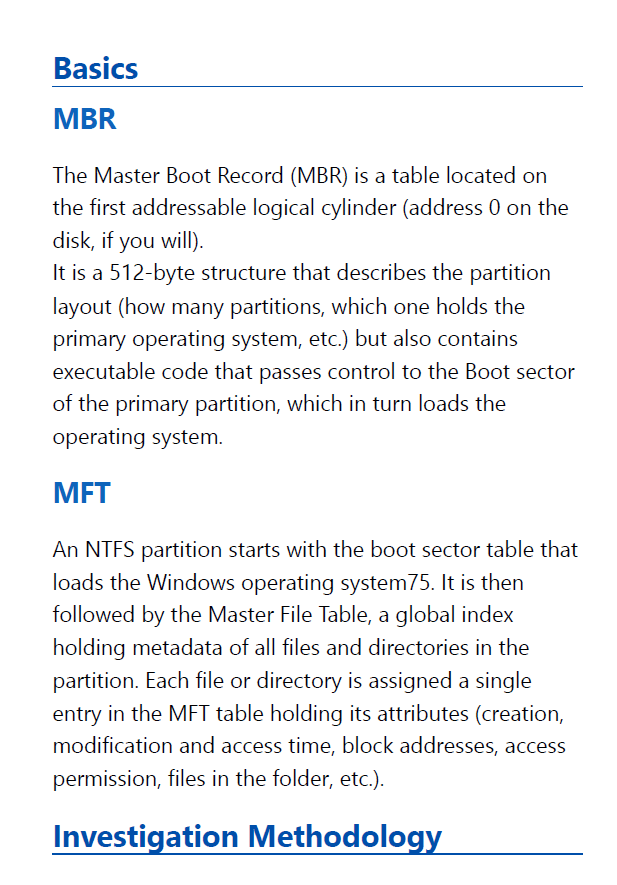Computer Forensics is a vast field comprising many sub-categories and requires an in-depth knowledge in operating systems, networking and other areas that go under security. In computer forensics, digital data is gathered and examined in order to be used as evidence in administrative, criminal, or civil matters.
Computer forensics generally examines data that is retrievable from a computer’s hard disk or other storage medium. It’s possible that the data you need is already on the drive, but it can be difficult to locate or understand. Network forensics, on the other hand, provides details about how a culprit or an attacker got access to a network.
Log files are used by network forensics investigators to ascertain when people signed on, which URLs they accessed, how they logged on to the network, and from where. However, keep in mind that network forensics also seeks to ascertain what changes were made and what new files or tracks were left on a victim’s machine.
Data recovery, which is restoring data from a computer after it has been accidentally erased, lost due to a power outage, or otherwise destroyed, is another distinction between computer forensics and data recovery. Usually, when it comes to data recovery, you know what you’re looking for. In computer forensics, material that users have concealed or erased must be recovered with the aim of confirming its validity so that it can be used as evidence.
Why will you need a notes system?
You could be actively working as computer forensics specialist or you could be preparing and studying for a certification exam such as CHFI. In both cases, a set of notes maintained in your repository where you can search for commands, concepts or use cases that could aid you in the task you are performing is necessary for a productive studying and/or working.
Who Are These Notes For?
- Professionals who are actively working in the field and need a set of ready and consice computer and digital forensics notes.
- Active learners who want a precise and concise resource composed of compiled and ready to learn computer and digital forensics notes.
The Computer & Cyber Forensics Study Notes Catalog PDF
Computer forensics study notes & guide serves as a go-to manual for both beginners and experienced professionals in digital forensics. It thoroughly addresses the procedures for collecting, analyzing, and preserving evidence from digital systems, including volatile memory, hard disks, and network logs.
Key insights include the correct order of volatility, chain of custody maintenance, advanced disk imaging, metadata and file signature analysis, and practical use of tools like FTK Imager, Autopsy, Volatility, and Scalpel. The guide balances legal considerations with hands-on technical methods, ensuring forensic integrity. In the end, it emphasizes pre-imaging data preservation, artifact correlation, and system-level insights, making it a definitive source for forensics learning and practice.
Table of contents:
– Computer & Digital Forensics Procedure
– Disk Forensics
– Memory Forensics
– Forensics using KAPE
– Network Forensics
– Windows Registry Forensics
– Malware Detection & Analysis
Page count: 381
Format: PDF


Testimonials (LinkedIn)
How to buy the booklet?
You can buy the booklet directly by clicking on the button below
Computer Forensics Field Notes
After you buy the booklet, you will be able to download the PDF booklet along with the markup files if you want to import them to Obsidian software.
What about the notes updates?
if you have been following my YouTube Channel, you definitely know that those who subscribe to the second tier of my channel membership they instantly get access to a vast catalog of cybersecurity, penetration testing, digital marketing, system administration and data analytics notes catalog for 10$ along with the ability to receive all notes updates as long as they are subscribed so what does that mean?
This means if you want to stay up to date with the changes and updates to the notes and get access to other categories, I encourage to join the channel membership second tier instead. However, if you are fine with downloading the current version of this section of the notes then you can buy this booklet instead for a one-time payment.
Will the prices of this booklet change in the future?
Once another version of this booklet is released, which it will, the price will slightly change as the booklet will include more contents, notes and illustrations.
Free Computer Forensics Training
Checkout the playlist below on my YouTube channel for Free Computer Forensics Training

